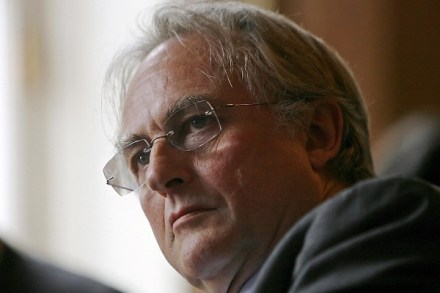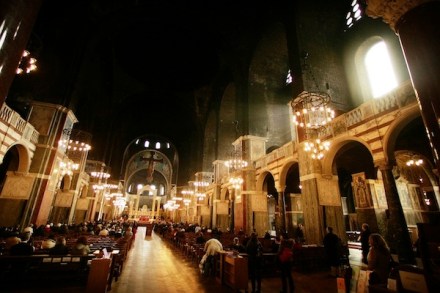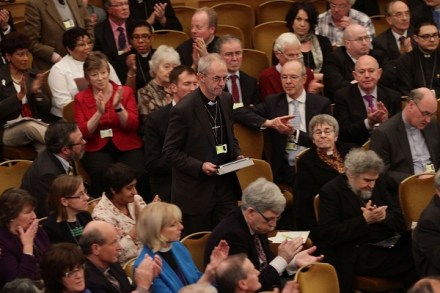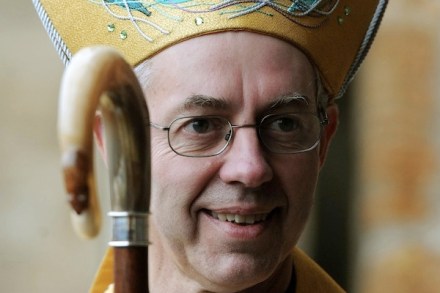Video: Debating Richard Dawkins
The video of my debate with Richard Dawkins, Rowan Williams and Tariq Ramadan is now available online. Richard Dawkins speaks third, and I speak last.
The video of my debate with Richard Dawkins, Rowan Williams and Tariq Ramadan is now available online. Richard Dawkins speaks third, and I speak last.
I spent Thursday evening at the Cambridge Union debating the motion ‘This House believes religion has no place in the 21st century.’ I spoke against the motion. My opponents on the opposite side included Richard Dawkins. My opponents on my own side were Rowan Williams and Tariq Ramadan. Anyhow – there has been a certain amount of press coverage and a number of readers have got in touch. This is just to say that I hope to post the video of the debate here as soon as it becomes available. UPDATE: Video of the debate is available here.

Shall We Gather At The River is a book of unfortunate endings — the stories of nine suicides hang from a plot-line that tells of a freak flood in the small Irish town of Murn. Fittingly for a book preoccupied with endings, we begin at the end: our hero, Enoch O’Reilly, is sitting in his father’s basement and staring down the barrel of a gun. The narrative then leaps backwards by 28 years to give us Enoch as a child in that same basement, stumbling upon his father’s old radio equipment and finding, in that forbidden room, a radio that channels an Old Testament sermon delivered in such rousing style

Personally, I don’t wear a cross, on the basis that I’m not much of an advertisement for Christianity and I’d risk diminishing the brand. But for Eric Pickles, Communities Secretary, and Nadia Eweida, the former British Airways employee who has just won her appeal about cross-wearing at work at the European Court of Human Rights, it’s a basic freedom. It’s hard to gainsay the judges’ view that manifesting your faith is a ‘fundamental right’. Any organisation that doesn’t have a problem about Muslim women wearing scarves and Sikh men wearing turbans but which gets uppity about a small cross, really does have a problem with consistency. As Pickles says, the symbol should

Whenever I give lectures on my book on censorship – Whaddya mean you haven’t read it? Buy it here at a recession-beating price – I discuss the great issues of the wealthy to silence critics, the conflict between religion and freedom of thought and the determination of dictators to persecute dissenters. These themes have animated great philosophers. None more so, I continue, than Trey Parker and Matt Stone, the creators of South Park, who managed to get them all into one cartoon. In a 2005, they broadcast an episode entitled Trapped in the Closet. The little boy Stan goes to one of the Scientologists’ personality testing centres. His “Thetan” levels

I’m conducting an experiment: Life of Pi concerns a basic metaphor about faith, how is that metaphor rendered in print and on screen? I’ve re-read the book. I’ve deliberately (at this stage) not watched Ang Lee’s film; rather, I’ve found a reviewer of the film (Jonathan Kim of the Huffington Post) who has not read the book, and then I’ve compared notes. Jonathan Kim has derided what he saw, at least from the perspective of the metaphor: ‘Life of Pi is more about the nuts and bolts of a teenager surviving at sea and bonding with a tiger than a spiritual quest that asks hard questions about the wisdom, will, and existence

‘Prayer’ Prayer the Church’s banquet, angels’ age, God’s breath in man returning to his birth, The soul in paraphrase, heart in pilgrimage, The Christian plummet sounding heaven and earth; Engine against the Almighty, sinner’s tower, Reversed thunder, Christ-side-piercing spear, The six-days-world-transposing in an hour, A kind of tune, which all things hear and fear; Softness, and peace, and joy, and love, and bliss, Exalted manna, gladness of the best, Heaven in ordinary, man well dressed, The milky way, the bird of paradise, Church-bells beyond the stars heard, the soul’s blood, The land of spices; something understood. St Augustine argued that Christians pray for themselves, not for God. God is self-sufficient

‘I’m spiritual, not religious’ is something people say to make themselves sound interesting. It doesn’t work. What is intriguing, though, is that, according to this new survey, those who see themselves as spiritual but don’t follow conventional religion are far more likely to be mentally ill. Now, before you trolly atheists out there in webland start typing ‘What a lot of crap. … anyone who believes in God is nuts. LMFAO!!’, read me out. Yes, we might have a case of chicken-and-egg here — the chicken being mental illness and the egg being the thirst for existential understanding. Or vice-versa. But the survey might also go to prove the value


Douglas Murray makes a striking point on his Spectator blog about the violent persecution that many Christians face across the globe, while the Church of England fights over gay marriage and women bishops. Christians in this country do fear that they are being persecuted, too, with a case making the headlines at the weekend about a Baptist who had unsuccessfully sued her employers for forcing her to work Sundays. Actually, in Celestina Mba’s case, it does sound rather unfair that she came under pressure to work on Sundays when she had asked at the start of her employment to be exempted from doing so on the grounds of her religious belief.
My word, the latest kerfuffle over gay marriage runs the gamut from dumb to dumber. Here, for instance, is Cristina Odone: He may get away with bullying a great many – perhaps the majority – into accepting his proposals. But in doing so Cameron will create a less liberal and tolerant society. Those who have held fast to their principles, will have to accept what the majority wants. But will the majority respect what the minority believes in? Not in Cameron’s Britain, they won’t. The moment the vicar or priest refuses to celebrate a gay marriage in their church, the aggrieved couple will see them in court — in Strasbourg. Here, at the


In December 1936, following the Abdication of Edward VIII, a rhyme circulated about the Archbishop of Canterbury, Cosmo Lang: ‘My Lord Archbishop, what a scold you are! And when your man is down, how bold you are! Of Christian charity how scant you are! And, auld Lang swine, how full of cant you are!’ Lang had made a particularly ill-judged broadcast three days after the Abdication, which caused considerable offence. The widespread view of Lang is that he impotently wrung his hands on the sidelines before the Abdication, after which he made his disastrous broadcast. A different view was taken by the Duke of Windsor in his memoirs: ‘Behind [the
‘Whig and Tory Scratch and Bite’, by Aaron Hill Whig and Tory scratch and bite, Just as hungry dogs we see: Toss a bone ‘twixt two, they fight, Throw a couple, they agree. Tribal party politics are three-hundred years old in Britain. So is the fashion for satire which aspires to rise above it all. The British people have been dealing with political parties since the 1670s. It was then that a faction led by the Earl of Shaftesbury tried to have Parliament pass a law to prevent Charles II’s brother James from succeeding to the throne. Charles had no legitimate children so James was next in line. He was

One of the things we know about the next Archbishop of Canterbury, Justin Welby, is that he doesn’t like bankers. Another is that he has given a good deal of thought to the question of social sin – a trickier concept than personal, individual failings. A third is that he has been profoundly influenced by the social teaching of a nineteenth century pope, Leo XIII, as expressed in his 1891 encyclical, Rerum Novarum. It’s available online, just twenty pages long. That encyclical is a curious document to read now: some of it feels anachronistic (if you like women bishops, you’re going to hate the bit about fathers as the natural

Even friends of an Established church like myself – though I’m a Catholic – should think twice about the wisdom of the idea after the naked political interference in the affairs of the CofE in the Commons. The Speaker, who is non-religious/agnostic, was among the most overt in encouraging MPs to overturn the church’s decision not to approve women bishops. Perhaps, he suggested, they might like to refer the matter to the Equalities Minister (Maria Miller)? It was more or less to say that the equalities legislation should be brought to bear on the CofE when it comes to its way of appointing bishops. Ben Bradshaw too was all in

This morning’s newspapers (and indeed the airwaves) are full of apocalyptic predictions about the future of the Church of England. The failure of the General Synod to ordain women bishops has surprised plenty of bishops, many of whom express their ‘deep sadness’ about the affair to the (£) Times’ Ruth Gledhill. Yet the threat of schism on this issue is not wholly surprising, not least because the Anglican Church has rarely taken happily to reform. From the storms over Matthew Parker’s 39 Articles to this latest controversy, the C of E’s evolution has often been fractious. However, as a relatively faithful parishioner of the CofE, this affair does surprise me in

Born in 1934 in Nigeria, Wole Soyinka is the author of more than twenty plays, ten volumes of poetry, two novels, seven collections of essays and five autobiographical works. He won the Nobel Prize for Literature in 1986. He was the first black African man to win the prestigious prize His latest book, Of Africa, is a 200-page polemic that attempts to understand the contradictory nature of African politics. Two important questions that arise from Soyinka’s book are: what is Africa? And what do we understand of its history? Soyinka expends considerable effort in his book discussing how the nihilist nature of fundamentalist Islam is destroying societies in certain African

This is a video of a speech to Oxford Brookes University on freedom and its enemies based on my book on censorship You Can’t Read This Book.
Since the publication of her debut collection, Satan Says in 1980, which was awarded the inaugural San Francisco Poetry Center Award, Sharon Olds has become a prominent – and controversial – voice in American poetry. Olds’ work has been given many unflattering adjectives from her harshest critics: self-indulgent, sensationalist, solipsistic, and pornographic, to name a few. While her confessional, and overtly autobiographical style, may not be to every critics’ taste, Olds’ candid voice, describing her own troubled childhood; the human body; and a world which very often displays fear, violence, love and kindness, in equal measure, has seen her become one of the most widely read poets of her generation.

So, another Old Etonian at the apex of the British establishment: Justin Welby, the Bishop of Durham, will be the next Archbishop of Canterbury. It’s sweet, in a way. All we need now is an OE named as Bank of England Governor, and David Cameron’s alma mater will have the complete power set. But it would be wrong to be too chippy about Welby’s elevation. Representatives at Number 10 actually pushed for John Sentamu, the charismatic conservative African, who had the blessing of, among others, Rod Liddle. But they got Welby instead. And why not? He seems a worthy enough choice, regardless of his ‘lack of experience’ as a bishop – he’s a

‘To the Grave’ Unclasp thy womb, thou mortuary shrine, And take the worst part of the best we had. Thou hast no harbourage for things divine, That thou had’st any part was yet too bad. Graves, for the grave, are fit, unfit for thee Was our sweet branch of youthful royalty. Thou must restore each atom back again When that day comes that stands beyond all night. His fame (meanwhile) shall here on earth remain, Lo thus we have divided our delight: Heaven keeps his spirit stalled amongst the just, We keep his memory, and thou his dust. Prince Henry was the eldest son of James I and VI (that’s
